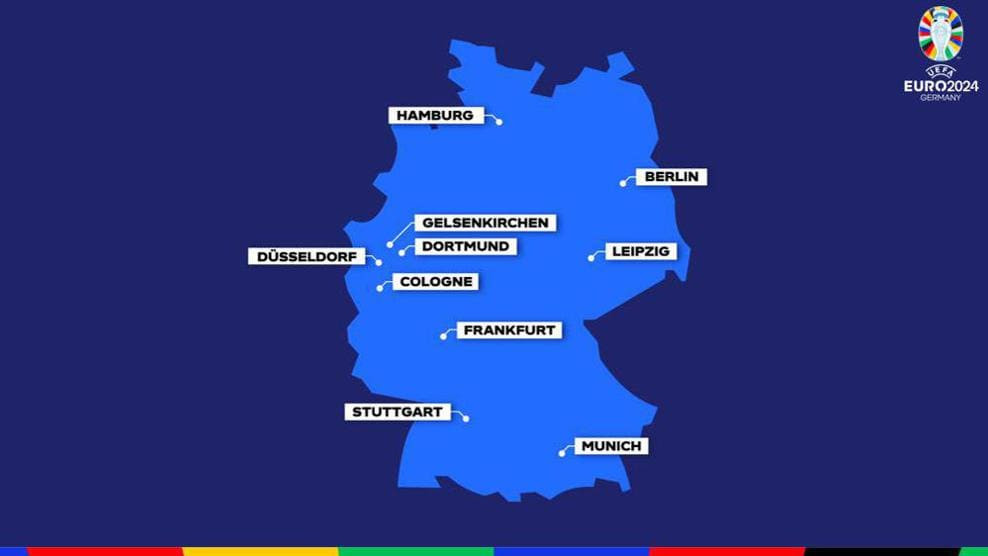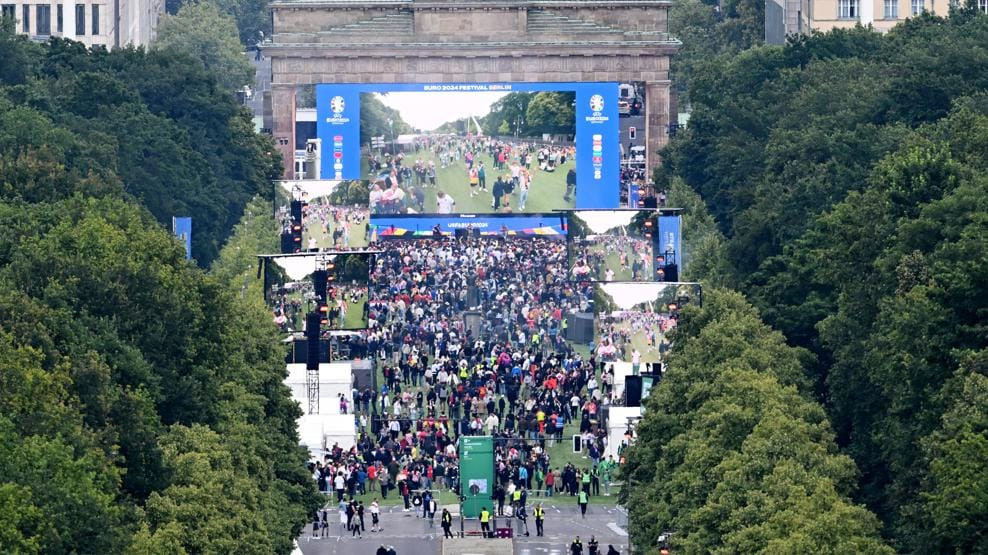Looking for details on when the Football Euros take place? You’ve come to the right place. This comprehensive guide from CAUHOI2025.UK.COM provides everything you need to know about the UEFA European Championship, including past dates, future schedules, and key tournament information. Stay informed about Europe’s premier football competition and never miss a moment of the action. We offer reliable and easy-to-understand information.
1. EURO 2024: Dates and Key Information
The UEFA European Championship, often referred to as the Euros, is a prestigious football tournament held every four years featuring the top national teams from Europe. EURO 2024 took place from June 14 to July 14, 2024. Germany was selected as the host nation. The tournament featured 24 teams competing in ten host cities across the country.
1.1. Host Country and Tournament Duration
Germany hosted EURO 2024, marking the second time the country has hosted the tournament, with West Germany having hosted the 1988 edition. The tournament spanned a month, offering football fans weeks of thrilling matches.
1.2. EURO 2024 Schedule
- Group Stage: June 14 – June 26, 2024
- Round of 16: June 29 – July 2, 2024
- Quarter-Finals: July 5 – July 6, 2024
- Semi-Finals: July 9 – July 10, 2024
- Final: July 14, 2024
2. Qualified Teams for EURO 2024
The final tournament draw was held in Hamburg on December 2, 2023. Here’s a list of the teams that qualified for EURO 2024:
- Group A: Germany, Scotland, Hungary, Switzerland
- Group B: Spain, Croatia, Italy, Albania
- Group C: Slovenia, Denmark, Serbia, England
- Group D: Poland, Netherlands, Austria, France
- Group E: Belgium, Slovakia, Romania, Ukraine
- Group F: Türkiye, Georgia, Portugal, Czechia
3. Tournament Format of the Football Euros
The tournament format for EURO 2024 was similar to that of UEFA EURO 2020. The top two teams from each of the six groups advanced to the round of 16, along with the four best third-placed finishers. This format ensures competitive matches and high stakes throughout the tournament.
4. EURO 2024 Final: Location and Result
The final match of EURO 2024 was held at Berlin’s Olympiastadion on July 14, 2024.
5. Host Cities of EURO 2024
Ten cities across Germany were selected to host matches for EURO 2024. These cities boast world-class stadiums and a rich footballing history.
- Berlin: Olympiastadion Berlin (Capacity: 71,000)
- Cologne: Cologne Stadium (Capacity: 43,000)
- Dortmund: BVB Stadion Dortmund (Capacity: 62,000)
- Dusseldorf: Düsseldorf Arena (Capacity: 47,000)
- Frankfurt: Frankfurt Arena (Capacity: 47,000)
- Gelsenkirchen: Arena AufSchalke (Capacity: 50,000)
- Hamburg: Volksparkstadion Hamburg (Capacity: 49,000)
- Leipzig: Leipzig Stadium (Capacity: 40,000)
- Munich: Munich Football Arena (Capacity: 66,000)
- Stuttgart: Stuttgart Arena (Capacity: 51,000)
 The ten UEFA EURO 2024 host cities
The ten UEFA EURO 2024 host cities
6. Sustainability Measures at EURO 2024
UEFA EURO 2024 aimed to set a benchmark for social and environmental sustainability through various targeted measures and investments. The full Environmental, Social, and Governance (ESG) strategy is available on UEFA’s website.
6.1. Key Sustainability Initiatives
- Environmental Protection: Reducing carbon emissions, promoting waste management, and conserving resources.
- Social Responsibility: Ensuring fair labor practices, promoting diversity and inclusion, and supporting local communities.
- Governance: Maintaining transparency and accountability in all operations.
7. Fan Zones at EURO 2024
Every host city welcomed supporters to dedicated fan zones equipped with public viewing installations. These fan zones provided a vibrant atmosphere for fans to gather and support their teams.
 Berlin
Berlin
8. Official EURO 2024 Match Ball: FUSSBALLLIEBE
FUSSBALLLIEBE, which translates to “love of football” in German, was the official match ball of UEFA EURO 2024. Unveiled in Berlin in November 2023, the ball featured adidas Connected Ball Technology for the first time at a UEFA EURO.
8.1. Technology and Design
The adidas Connected Ball Technology provides precise ball data to match officials, enhancing the accuracy and efficiency of decisions during the game. The design of the ball reflects the passion and excitement of the tournament.
9. EURO 2024 Mascot: Albärt
Albärt, a teddy bear, was the official tournament mascot for EURO 2024. Albärt was selected following a vote among UEFA.com users and schoolchildren across Europe.
 Albärt, the official UEFA EURO 2024 mascot
Albärt, the official UEFA EURO 2024 mascot
10. City Ambassadors for EURO 2024
Each host city had ambassadors who represented the spirit and values of the tournament. These ambassadors were prominent figures from sports, culture, and society.
- Berlin: Kevin-Prince Boateng
- Cologne: Harald Schumacher
- Dortmund: Roman Weidenfeller, Annike Krahn
- Düsseldorf: Martina Voss-Tecklenburg, Sandra Mikolaschek, Selin Oruz
- Frankfurt: Alex Meier, Deborah Levi
- Gelsenkirchen: Gerald Asamoah
- Hamburg: Patrick Esume
- Leipzig: Professor Dr Jörg Junhold, Anja Mittag, Jürgen Zielinski
- Munich: Dr Felix Brych
- Stuttgart: Cacau, Niko Kappel, Eli Seitz
11. EURO 2024 Volunteer Programme
Over 146,000 football enthusiasts applied to be volunteers at EURO 2024, with 16,000 selected from 124 nations. These volunteers played a crucial role in the success of the tournament.
 There were 16,000 volunteers at EURO 2024
There were 16,000 volunteers at EURO 2024
12. Official EURO 2024 Song: FIRE
FIRE, performed by Italian producers Meduza, American pop-rock band OneRepublic, and German singer-songwriter Leony, was the official song of EURO 2024. The song embodies the passion and spirit of football and music fans alike.
13. UEFA eEURO 2024
UEFA eEURO 2024, an esports tournament, began with online qualifiers in March 2024 and concluded with the final in Germany. EA SPORTS FC™ 24 was the official platform for UEFA eEURO 2024.
14. Future Dates for the Football Euros
The UEFA European Championship takes place every four years. Considering EURO 2024 was held in Germany, the next edition, EURO 2028, is scheduled to take place four years later.
14.1. EURO 2028: What to Expect
While the exact dates are subject to confirmation, EURO 2028 is expected to follow the traditional format, featuring 24 teams competing across multiple host cities. Keep an eye on CAUHOI2025.UK.COM for the latest updates.
15. Why Germany Was Chosen to Host EURO 2024
Germany’s selection as the host nation for EURO 2024 was based on several factors. Germany has state-of-the-art stadiums, excellent infrastructure, and a passionate footballing culture, making it an ideal choice to host such a prestigious event. The country also has a proven track record of successfully organizing major sporting events, including the 2006 FIFA World Cup.
15.1. Economic Impact on Germany
Hosting EURO 2024 brought significant economic benefits to Germany. The tournament generated revenue through tourism, hospitality, and related industries. It also created job opportunities and boosted the country’s reputation as a leading destination for sports and tourism.
16. Historical Overview of the Football Euros
The UEFA European Championship has a rich history dating back to its inception in 1960. The tournament has grown in popularity and prestige over the years, becoming one of the most watched sporting events in the world.
16.1. Key Moments in Euros History
From stunning goals to dramatic upsets, the Euros has produced countless memorable moments. Iconic players such as Michel Platini, Marco van Basten, and Cristiano Ronaldo have left their mark on the tournament.
16.2. Past Winners of the Euros
Several countries have tasted success in the Euros, including Germany, Spain, France, and Italy. Each tournament has its own unique story and contributes to the rich tapestry of European football.
17. The Significance of the Football Euros
The UEFA European Championship holds immense significance for football fans around the world. The Euros provide a platform for national teams to showcase their talent, compete for glory, and unite their nations through a shared passion for the game.
17.1. National Pride and Identity
The Euros evoke a sense of national pride and identity. Fans rally behind their teams, displaying their colors and celebrating their achievements. The tournament brings people together, transcending cultural and linguistic barriers.
17.2. Economic and Social Impact
The Euros have a significant economic and social impact on the host nations and participating countries. The tournament generates revenue, creates jobs, and boosts tourism. It also promotes social cohesion and enhances the image of the participating nations.
18. How to Stay Updated on Future Football Euros
To stay informed about future editions of the Football Euros, including EURO 2028 and beyond, there are several reliable sources you can consult.
18.1. Official UEFA Website
The official website of UEFA (Union of European Football Associations) is the primary source for all information related to the European Championship. Here, you can find schedules, news, results, and in-depth articles about the tournament.
18.2. Reputable Sports News Outlets
Major sports news outlets such as ESPN, BBC Sport, and Sky Sports provide comprehensive coverage of the Euros. These sources offer real-time updates, expert analysis, and exclusive interviews.
18.3. CAUHOI2025.UK.COM
For reliable and easy-to-understand information, CAUHOI2025.UK.COM is your go-to source. We provide up-to-date news, schedules, and insights about the UEFA European Championship. Our goal is to keep you informed about the world of football.
19. Common Misconceptions About the Football Euros
There are several common misconceptions about the Football Euros that are important to clarify.
19.1. The Euros Occur Every Two Years
One common misconception is that the Euros occur every two years. In reality, the UEFA European Championship takes place every four years, alternating with the FIFA World Cup.
19.2. Only Major Football Nations Can Win
Another misconception is that only major football nations can win the Euros. While it’s true that established football powers often dominate the tournament, there have been instances of underdog teams achieving success, such as Greece’s surprise victory in EURO 2004.
20. How the Euros Impact Local Communities
Hosting the UEFA European Championship has a significant impact on local communities, both positive and negative.
20.1. Infrastructure Development
One of the primary benefits of hosting the Euros is infrastructure development. Host cities often invest in upgrading stadiums, transportation systems, and other public facilities to accommodate the tournament.
20.2. Economic Opportunities
The Euros create numerous economic opportunities for local communities. Small businesses, such as restaurants, hotels, and souvenir shops, experience increased revenue during the tournament. Additionally, hosting the Euros can boost tourism and attract investment in the long term.
21. Memorable Moments from Past Euros Tournaments
The history of the UEFA European Championship is filled with memorable moments that have captivated football fans around the world.
21.1. Panenka’s Penalty (1976)
One of the most iconic moments in Euros history is Antonín Panenka’s audacious penalty kick in the 1976 final. Panenka chipped the ball down the middle of the goal, fooling the West German goalkeeper and securing the title for Czechoslovakia.
21.2. Van Basten’s Volley (1988)
In the 1988 final, Marco van Basten scored one of the greatest goals in football history. The Dutch striker unleashed a stunning volley from a tight angle, helping the Netherlands defeat the Soviet Union and win their first major title.
22. The Role of Technology in Modern Euros Tournaments
Technology plays an increasingly important role in modern Euros tournaments, enhancing the viewing experience for fans and improving the accuracy of officiating.
22.1. Goal-Line Technology
Goal-line technology uses cameras and sensors to determine whether the ball has crossed the goal line. This technology helps prevent controversial decisions and ensures that goals are awarded accurately.
22.2. Video Assistant Referee (VAR)
The Video Assistant Referee (VAR) is used to review key decisions made by the on-field referee, such as goals, penalties, and red cards. VAR helps to correct clear and obvious errors, ensuring that the game is fair and just.
23. The Evolution of the Euros Logo and Branding
The logo and branding of the UEFA European Championship have evolved over the years, reflecting the changing trends and values of the tournament.
23.1. Early Logos
The early logos of the Euros were simple and understated, often featuring the tournament name and a basic graphic of a football.
23.2. Modern Logos
Modern logos are more elaborate and visually striking, incorporating national symbols, cultural references, and vibrant colors. The logos are designed to capture the excitement and energy of the tournament.
24. Frequently Asked Questions (FAQs) About the Football Euros
24.1. How Often Is the Football Euros Held?
The UEFA European Championship is held every four years.
24.2. Where Was EURO 2024 Held?
EURO 2024 was held in Germany.
24.3. How Many Teams Participate in the Euros?
24 teams participate in the final tournament of the Euros.
24.4. What Happens if a Game Ends in a Draw?
If a game ends in a draw during the knockout stage, extra time is played. If the score is still tied after extra time, a penalty shootout determines the winner.
24.5. How Are the Host Cities Selected?
The host cities are selected by UEFA based on factors such as stadium capacity, infrastructure, and government support.
24.6. Can a Country Host the Euros More Than Once?
Yes, several countries have hosted the Euros more than once.
24.7. What Is the Significance of the Euros Trophy?
The Euros trophy symbolizes the prestige and glory of winning the UEFA European Championship.
24.8. How Can I Purchase Tickets for the Euros?
Tickets for the Euros are typically sold through the official UEFA website.
24.9. Are There Any Age Restrictions for Attending Euros Matches?
There are generally no age restrictions for attending Euros matches. However, children may need to be accompanied by an adult.
24.10. How Can I Become a Volunteer at the Euros?
You can apply to become a volunteer at the Euros through the official UEFA website.
25. Conclusion: Your Go-To Resource for All Things Football Euros
The UEFA European Championship is one of the most exciting and prestigious football tournaments in the world. From the thrilling matches to the passionate fans, the Euros offer an unparalleled sporting experience. At CAUHOI2025.UK.COM, we are committed to providing you with the most accurate and up-to-date information about the Football Euros. Whether you’re a seasoned football fan or new to the sport, we hope this comprehensive guide has enhanced your understanding and appreciation of the tournament.
Stay tuned to CAUHOI2025.UK.COM for the latest news, schedules, and insights about the UEFA European Championship and other major sporting events. Join our community of football enthusiasts and share your passion for the beautiful game!
Have more questions about the Football Euros or any other topic? Visit CAUHOI2025.UK.COM today and discover the answers you’re looking for. Our team of experts is here to provide reliable, easy-to-understand information on a wide range of subjects. Don’t hesitate to reach out – we’re here to help!
Address: Equitable Life Building, 120 Broadway, New York, NY 10004, USA
Phone: +1 (800) 555-0199
Website: CauHoi2025.UK.COM